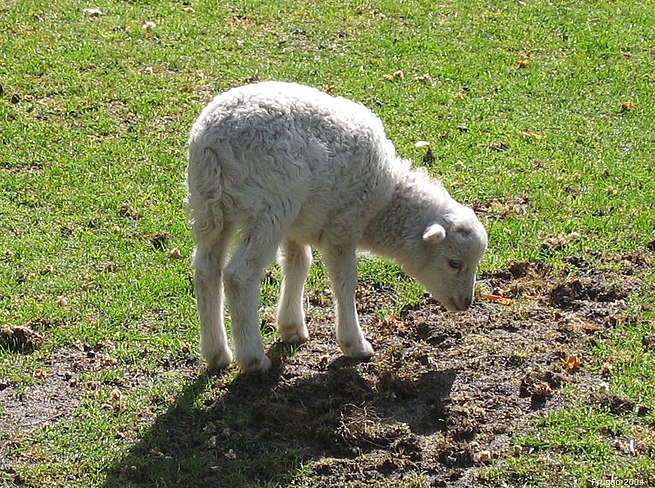
Main Difference
The main difference between Mutton and Chicken is that the Mutton is a meat of a sheep and Chicken is a domesticated fowl, primarily a source of food.
-
Mutton
Lamb, hogget and mutton are the meat of domestic sheep (species Ovis aries) at different ages.
A sheep in its first year is called a lamb, and its meat is also called lamb. The meat of a juvenile sheep older than one year is hogget; outside the USA this is also a term for the living animal. The meat of an adult sheep is mutton, a term only used for the meat, not the living animals. In the Indian subcontinent the term mutton is also used to refer to goat meat.Lamb is the most expensive of the three types, and in recent decades sheep meat is increasingly only retailed as “lamb”, sometimes stretching the accepted distinctions given above. The stronger-tasting mutton is now hard to find in many areas, despite the efforts of the Mutton Renaissance Campaign in the UK. In Australia, the term prime lamb is often used to refer to lambs raised for meat. Other languages, for example French, Spanish, Italian and Arabic, make similar, or even more detailed, distinctions between sheep meat by age and sometimes by gender and diet, though these languages do not always use different words to refer to the animal and its meat — for example, lechazo in Spanish refers to meat from milk-fed (unweaned) lambs.
-
Chicken
The chicken (Gallus gallus domesticus) is a type of domesticated fowl, a subspecies of the red junglefowl. It is one of the most common and widespread domestic animals, with a total population of more than 19 billion as of 2011. There are more chickens in the world than any other bird or domesticated fowl. Humans keep chickens primarily as a source of food (consuming both their meat and eggs) and, less commonly, as pets. Originally raised for cockfighting or for special ceremonies, chickens were not kept for food until the Hellenistic period (4th–2nd centuries BC).Genetic studies have pointed to multiple maternal origins in Southeast Asia, East Asia, and South Asia, but with the clade found in the Americas, Europe, the Middle East and Africa originating in the Indian subcontinent. From ancient India, the domesticated chicken spread to Lydia in western Asia Minor, and to Greece by the 5th century BC. Fowl had been known in Egypt since the mid-15th century BC, with the “bird that gives birth every day” having come to Egypt from the land between Syria and Shinar, Babylonia, according to the annals of Thutmose III.
-
Mutton (noun)
The flesh of sheep used as food.
-
Mutton (noun)
A sheep.
-
Mutton (noun)
Em, a unit of measurement equal to the height of the type in use.
-
Mutton (noun)
A prostitute.
-
Mutton (noun)
An old Anglo-French gold coin impressed with the image of a lamb.
-
Mutton (adjective)
deaf.
-
Chicken (noun)
A domestic fowl, Gallus gallus, especially when young.
-
Chicken (noun)
The meat from this bird eaten as food.
-
Chicken (noun)
A coward.
-
Chicken (noun)
A young or inexperienced person.
-
Chicken (noun)
A young, attractive, slim man, usually having little body hair; compare chickenhawk.
-
Chicken (noun)
The dare.
-
Chicken (noun)
A simple dance in which the movements of a chicken are imitated.
-
Chicken (adjective)
Cowardly.
“Why do you refuse to fight? Huh, I guess you’re just too chicken.”
-
Chicken (verb)
To avoid a situation one is afraid of.
-
Chicken (noun)
a domestic fowl kept for its eggs or meat, especially a young one
“rationing was still in force and most people kept chickens”
-
Chicken (noun)
meat from a chicken
“roast chicken”
-
Chicken (noun)
a game in which the first person to lose their nerve and withdraw from a dangerous situation is the loser
“he was killed by a car after he lay in the road playing chicken”
-
Chicken (noun)
a coward.
-
Chicken (adjective)
cowardly
“I was too chicken to go to court”
-
Chicken (verb)
withdraw from or fail in something through lack of nerve
“the referee chickened out of giving a penalty”
